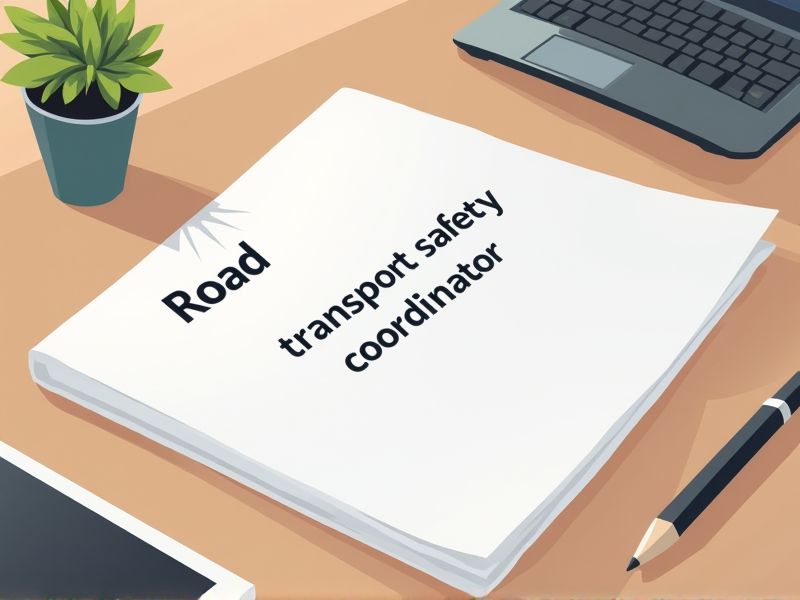
The role of a Road Transport Safety Coordinator involves navigating complex regulatory landscapes and ensuring compliance with safety standards. Certifications equip coordinators with the necessary knowledge to manage risk and improve safety procedures effectively. They demonstrate a commitment to industry best practices and can enhance the credibility of safety initiatives. Important certifications are essential for those pursuing a career as a Road Transport Safety Coordinator.
Certified Safety Professional (CSP)
The presence of a Certified Safety Professional (CSP) in road transport safety coordination enhances the implementation of comprehensive safety protocols, which can reduce accident rates. Proper risk assessment and hazard identification by a CSP can lead to targeted interventions and increased safety compliance. A CSP's expertise ensures alignment with national and international safety regulations, minimizing legal liabilities. Effective safety management by a CSP improves overall organizational safety culture, thus fostering safer transportation environments.
Certified Transportation Professional (CTP)
The Certified Transportation Professional (CTP) credential equips road transport safety coordinators with advanced knowledge of industry regulations and compliance standards. Enhanced expertise in logistics and risk management allows them to implement more effective safety protocols, reducing the likelihood of accidents. Being CTP-certified can increase credibility among peers and stakeholders, fostering trust and cooperation in safety initiatives. Continuous professional development associated with CTP ensures coordinators stay updated with emerging safety technologies and practices.
OSHA 30-Hour General Industry Certification
The OSHA 30-Hour General Industry Certification equips a Road Transport Safety Coordinator with a comprehensive understanding of workplace safety regulations, which is crucial for identifying and mitigating potential hazards. Without it, there's a higher likelihood of non-compliance with federal safety standards, potentially leading to accidents and costly penalties. The certification ensures that the coordinator can implement effective safety training, contributing to a reduction in injury-related incidents on the road. Having this certification can enhance the organization's safety culture, fostering a safer environment for both employees and the public.
Road Safety Management Certification
Road Safety Management Certification equips road transport safety coordinators with comprehensive knowledge of traffic regulations and safety protocols, directly reducing accident rates. Certification provides the necessary skills to assess and mitigate potential hazards on the road, enhancing preventive measures. Coordinators gain credibility with a recognized certification, facilitating collaborative efforts with authorities and stakeholders for better implementation of safety initiatives. Continuous learning through certification ensures coordinators stay updated with the latest safety standards and technological advancements.
Defensive Driving Certification
Defensive Driving Certification equips a Road Transport Safety Coordinator with essential skills to anticipate potential hazards, reducing accident risk. The certification enhances decision-making ability, which is vital in managing emergency situations effectively. Trained coordinators can implement safer driving practices across fleets, leading to a decrease in vehicular incidents. Certification fosters a culture of road safety within the organization, contributing to overall transport operations efficiency.
Accident Investigation Certification
Accident Investigation Certification equips a Road Transport Safety Coordinator with the skills to analyze traffic incidents comprehensively, identifying root causes of accidents. This expertise enables the adoption of correct safety measures, significantly reducing future occurrences and enhancing overall road safety. Certification ensures the coordinator is updated on legal protocols and technological advancements, improving compliance with safety regulations. Through structured training, certified coordinators can effectively communicate insights and recommendations, fostering a preventive safety culture within transport organizations.
First Aid and CPR Certification
First Aid and CPR certification equips a road transport safety coordinator with the necessary skills to respond effectively during medical emergencies, reducing potential harm. In the event of a traffic accident, a certified coordinator can provide immediate assistance, stabilizing victims until professional help arrives. Companies often require such certifications to ensure legal compliance and enhance workplace safety standards. The presence of trained personnel boosts overall confidence among team members and can contribute to a safer transportation environment.
HAZMAT Transportation Certification
HAZMAT Transportation Certification ensures road transport safety coordinators have the necessary knowledge to handle hazardous materials safely, reducing the risk of accidents. This certification equips coordinators with the skills to comply with complex regulations, ensuring legal adherence and avoiding potential penalties. By understanding proper labeling and packaging, certified professionals minimize environmental and health risks associated with hazardous material spills. Thorough training through certification enhances emergency response readiness, ensuring prompt and effective action during incidents.
Fleet Safety Management Certification
Fleet Safety Management Certification equips road transport safety coordinators with standardized knowledge to implement effective safety protocols. The certification process ensures coordinators are updated with the latest safety regulations and industry practices. Enhanced skills in risk assessment and incident prevention result from the training, reducing the likelihood of accidents. Employers benefit from reduced liabilities and insurance costs due to improved safety standards, providing financial incentives for certification.
Emergency Response and Crisis Management Certification
The presence of an Emergency Response and Crisis Management Certification equips a Road Transport Safety Coordinator with essential skills to effectively address unforeseen incidents, reducing potential harm and damage. With proper certification, coordinators are better prepared to implement safety protocols, ensuring compliance with regulatory standards and minimizing liability risks. The training also enhances their ability to efficiently coordinate with emergency services, which improves overall response times in critical situations. Certification helps build trust among stakeholders, including employees and the public, reinforcing confidence in the organization's commitment to safety.
Summary
With certifications, you can enhance your credibility and professionalism as a Road Transport Safety Coordinator. This certification often leads to improved safety protocols and reduced incident rates within your organization. You may also see a rise in career opportunities, given the specialized knowledge certified professionals bring to the table. Companies might experience increased compliance with safety regulations, directly impacting their operational efficiency.
